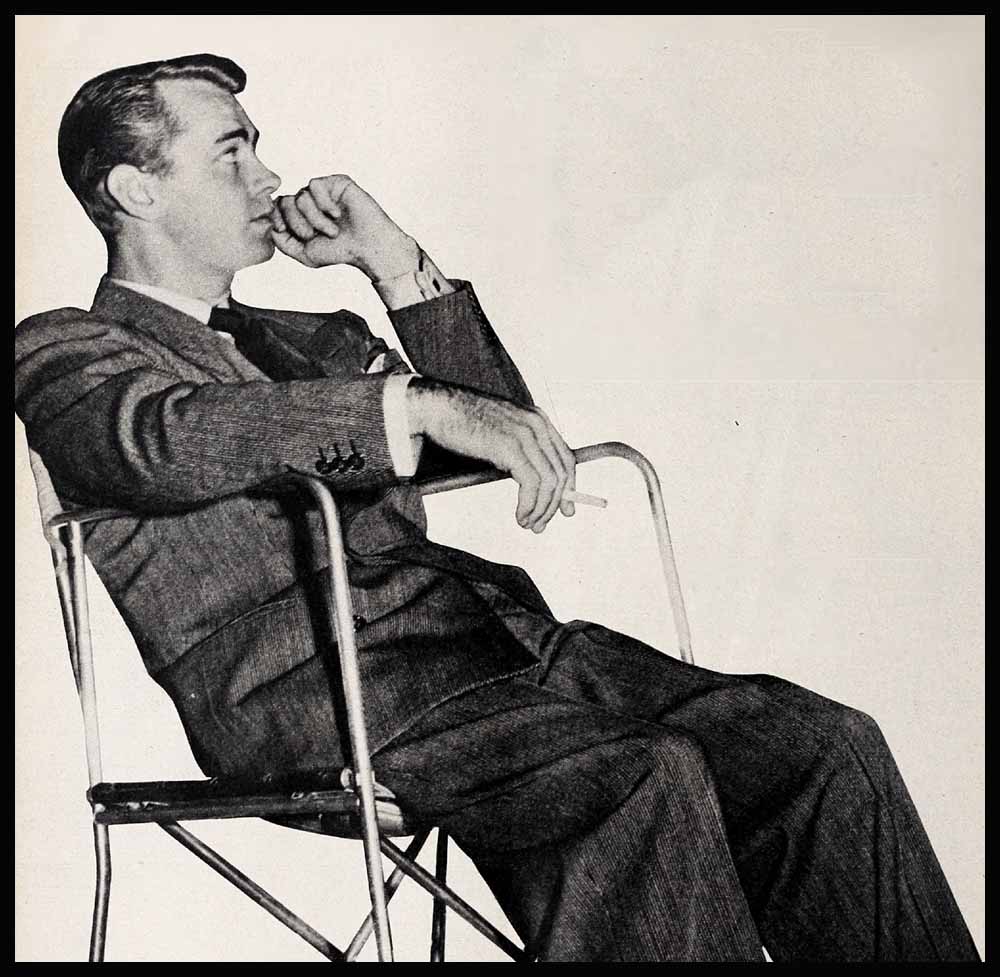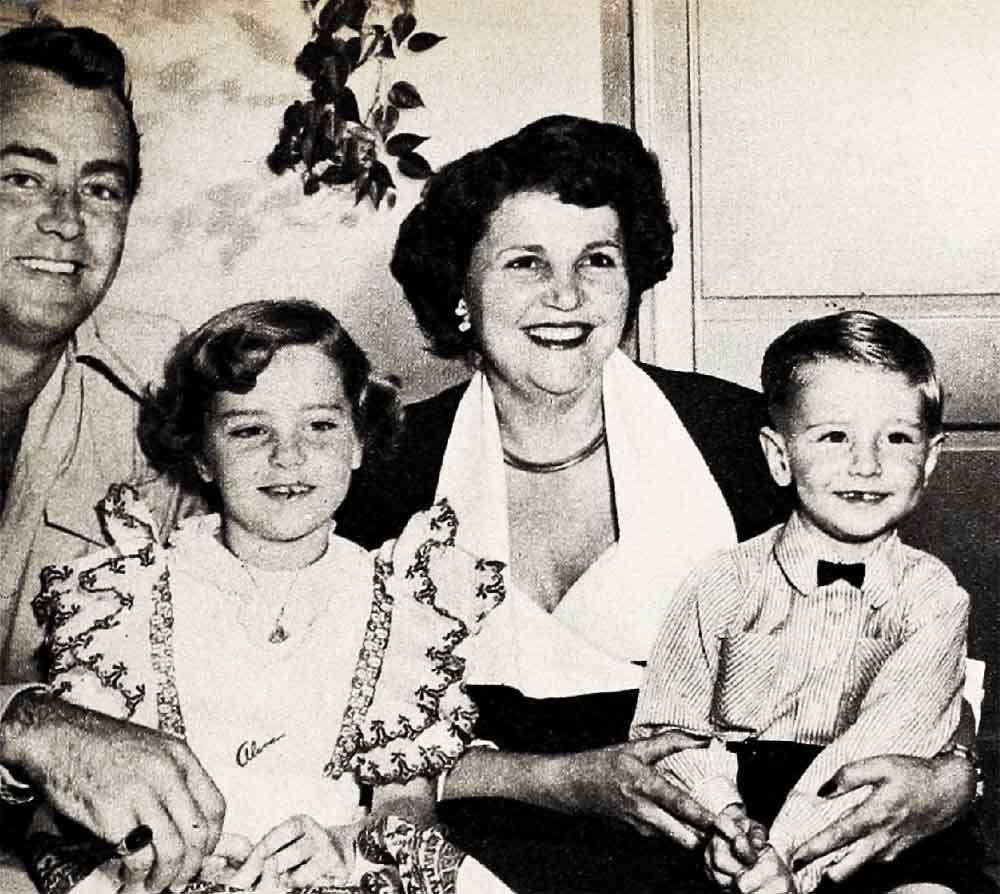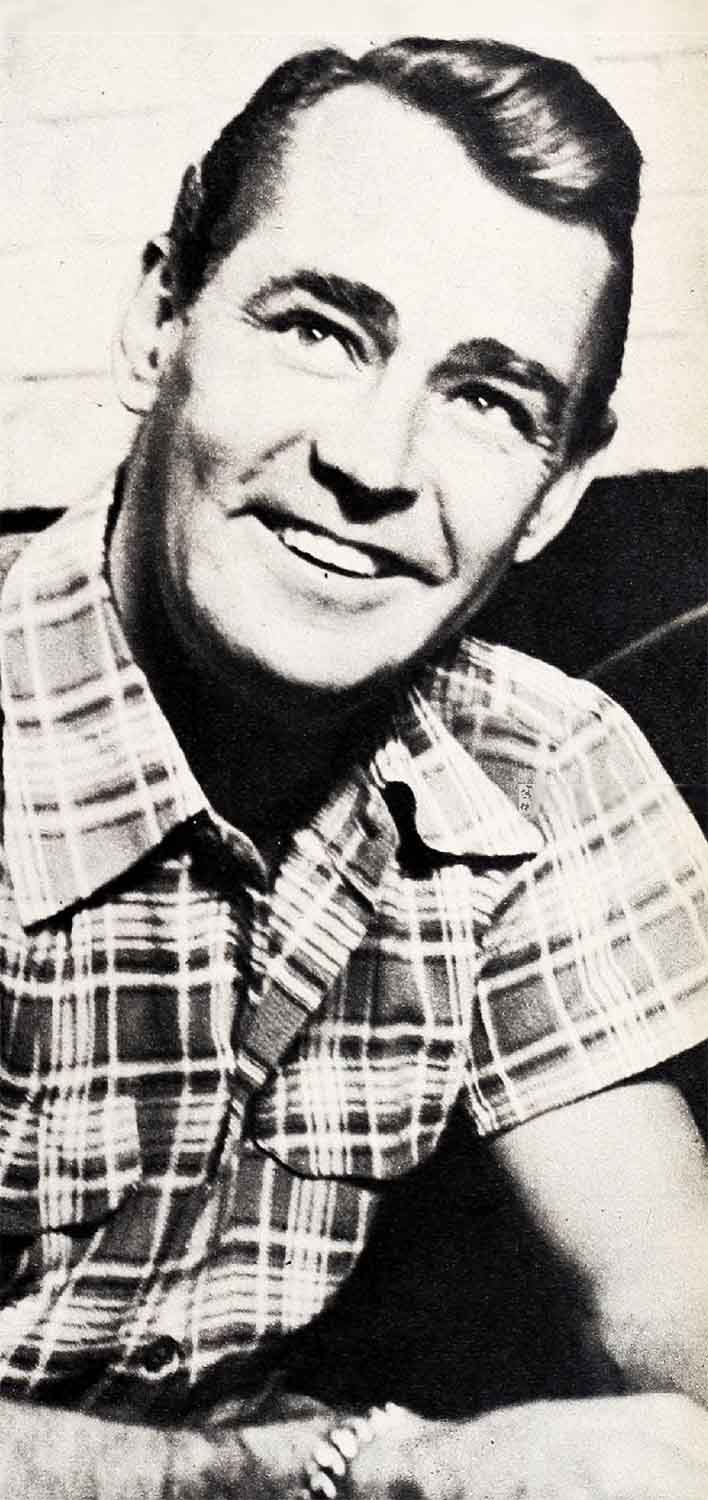
Nine Years With Love
On their ninth anniversary last income-tax day, Alan filled the house with flowers and gave his wife a check which read: “Pay to the order of Susie, $xxxxx. No money in the bank, but I love you, so please cash in for the rest of our lives.”
The gift didn’t sparkle like rubies nor gleam with the richness of furs, and it wasn’t worth a plugged nickel at the teller’s window. But it gave Sue a glow that you can’t buy across counters, and she put it away with other treasures of its kind. Marriage in Hollywood is a controversial subject that goes bouncing back and forth like a nonstop tennis ball. “What’s wrong with the place? Why can’t people out there stay hitched like anyone else?” That’s one side—And the other side answers, “Our marriage record is as good as that of the rest of the country. It just sounds as if we divorced more, because we hit the headlines and you don’t.”
In the final analysis, marriage anywhere depends on people, not on places, and the Ladds are a case in point. Knowing them, the wryest cynic would know that “for the rest of our lives” means exactly that. They don’t flaunt their happiness, nor do they take it for granted. But you feel that it’s built on rock and that ‘ Hollywood can’t touch it. Built any other way, it could fail apart in Hoboken.
They have no gimmicks or recipes to hand out. Love is a mystery. Nobody’s yet been able to explain why two particular people are drawn together, and not two i others. But there’s more to love than physical attraction, as every adult knows. In the course of Alan and Sue’s friendship, as struggling actor and agent, each grew to respect the other’s worth as a human. Because they felt and reacted alike, the wordless understanding between them was from the beginning almost uncanny. In some bigshot’s office, with no prearranged campaign, they’d play into each other’s hands like a couple of jugglers. Each knew when to speak, when to quit, when to get up and go. It was a new experience then, startling and delightful. Now, after nine years of marriage, it’s ingrained.

Professionally, Alan refers to himself as “we,” the other half being Sue. It’s long been accepted that where he goes, she goes,since he won’t go without her. You recognize her presence in the flowers that brighten their impersonal hotel room, and the magazines strewn about. This may seem like a minor item, but nothing’s minor to Sue that contributes to Alan’s relaxation. Many men on a business trip feel their wives are better off at home. Many men—let’s be honest—like to get away from their wives once in a while. Alan says: “I’d be lost without Sue—” He needs her for the comfort of her companionship and because of his vast respect for her judgment. Not that he invariably follows it, but he’ll take no major step till he’s thoroughly thrashed out all its aspects with Sue. Because of the harmony already noted between them, their conclusions are more likely than not to fuse.
Once they had a difference of opinion with Buddy DeSylva. DeSylva was a wise man and a fair one, who could see the other fellow’s side as well as his own. After tossing it back and forth, the boss advised them to go home and sleep on it. Next day they returned, still of the same mind. DeSylva threw them a curious little smile. “You two! You’ve got too much of that pillow talk between you. I can’t beat it. You win.”
Others have been less understanding. Everyone at the studio knows that Alan hates talking on the phone. Sue loves it. Acting as a buffer for him, she takes his calls. This is sometimes resented. “Who’s under contract here?” stormed an irate V.I.P. “Sue or Alan Ladd?”
“I am,” said Alan. “And if ever Sue makes a decision, I’d have made the same.”
One thing they avoid is running to Tom, Dick and Harry with their problems. This is not because they think they’re so all fired smart. “We just feel it’s no good when the husband goes pouring his heart out to Joe Doakes, and the wife can’t wait to talk it over with the girls. Outsiders can come between you, they can lead to fusses. Sue and I don’t look for advice till we’ve kicked it around ourselves. Then, if we’re stymied, we take someone into our confidence. But whoever it is, we go to him together.”
What catches your eye on first entering the Ladds’ living room are four pictured young faces, gazing gravely from shadowbox frames—Carol Lee, Laddie, Lonnie and little David. “My eaters,” Alan calls them with a grin. Like any family, they add to the light and laughter and sweetness of home. But the widely held notion that children can cure an ailing marriage doesn’t sit well with the Ladds. “It’s up to the parents, not the kids, to make a marriage work. We owe them security,” says Sue “Not the other way ’round.”

Security comes from an atmosphere of serenity. It’s produced by a feeling between two people that has deepened from the electrics of early romance to something enduring. “You can’t sit down and rationalize it,” says Alan. “Anyway, I can’t. You find that companionship with the other person satisfies you. You accept him for what he is. You don’t say, I’ll try to cure this habit or that. You say, I want to make him happy. Acceptance and understanding are the big things. They include all the rest.”
When Sue and Alan are out together, he has a way of making her feel important. He’s not full of a lot of baloney and five-dollar words. But there’s always a look, a smile, a touch that says, “I’m glad to be here with you. I’d rather be dancing with you than anyone else.”
“The place,” says Sue, “may be jumping with glamour girls. Goodness knows they’re better-looking than I am. But on the way home my husband never fails to pay me some little compliment. Of course it sets me up.”
Alan, for his part, maintains that she spoils him, but good. “Sue’s got the know how to take care of a man. I’ve seen women get so wrapped up in their kids, their friends, their bridge, their clubs, that the poor old guy comes home and sits on the sidelines like a scrub who’ll never make the team. Which leaves him wide open for the sympathetic ‘other woman.’ Thank heaven I’ve got a feminine wife. She bolsters my ego.”
Sue sniffs. “What ego? My great problem is that Alan always thinks he’s washed up tomorrow.”
“Could be I’m right,” he laughs, but he’s not kidding. Actors are supposed to be over-endowed with self-confidence. In which case, Alan’s no typical actor. Success doesn’t inflate, it amazes and humbles him.
He has a very attractive singing voice which he’s loath to use except in the shower. Asked to use it on a personal appearance tour, he nixed the suggestion as not altogether sane. But Sue and Kay Kyser framed him. Kyser was emceeing a show in a military hospital, where the Ladds joined him. He and Sue put their heads together. Without bothering to warn the unsuspecting soloist, Kay announced that Alan would now sing “My ideal.” What could he do, with the guys whooping and hollering! He sang “My ideal” and they raised the roof.
“See, you can sing,” said his double crossing wife.
“Yeah. That’s the one song I know all the words of.”
Lest I give the impression that the Ladds are too good to be human, let me cut in fast with an assurance to the contrary. Like all married pairs since Adam and Eve, they have their flare-ups. There was a time when Susie used to flounce out and take a walk. Naturally, she expected Alan to follow. He always did. One night, as she stomped down a dark boulevard, he caught up and got her into the car. “Now look,” he said. “This is no way to settle an argument. If you do it again, I won’t be home when you get there.”
That was her last walk. Not because she took him literally, but because he’d opened her eyes to the childishness of her operations and made her ashamed of them. Psychologists say that spats are important or not, depending on their source. Those of Alan and Sue rise from the surface, leaving the depths undisturbed. Normally, they settle a difference of opinion by hashing it out. Sometimes they fly off the handle, and the huff lasts till one or the other breaks it with an offhand overture. “Being angry with someone you love,” says Sue, “is like being ill. If you have any sense, you don’t prolong it, you heal it.”

Once Alan got mad because Sue returned a fur coat he’d bought for her birthday. “But, honey, it’s an extravagance. First, I don’t need it. Second, it won’t wear well—”
He was still mad. She shouldn’t have returned a gift—anyway, not without consulting him first. From behind her back she drew a little book. “I consulted this. It says we can’t afford it.”
There’s no comeback to a joint banking account. Alan threw in the towel.
They don’t see eye to eye on their social life. Alan much prefers playing host to guest, though he’ll go willingly to a friend’s home when not more than four or six are gathered together. Big parties, which bore him and make him uncomfortable, he’s got to be dragged to. Susie hankers after a party now and then, if only for the fun of getting dressed up. She’ll start working on Alan ’way ahead of time, and even then he’s been known to back out at the last minute. once for a couple of weeks he grew positively lamb-like. Wherever Sue wanted to go was okay with Ladd. She couldn’t figure it, but made hay while the making was good. Till the night came when she said, “We’ve been chasing too much. Let’s stay put.”
“Had enough?”
She looked up, and the light dawned. “So that’s been your little game.”
“You’re too smart by half, Susie.”
The score remains the same. He hates parties, she likes them. “But he hates them worse than I like them,” sighs Sue, “so we generally stay home.”
In basic matters, their ideas run parallel. Their home is for people they feel at home with—for friends, not influences. You won’t find them catering to producers for the sake of a role. But they’ll have the Peter Hansons because they like them. Hanson played in “Branded.” Both Sue and Alan think he has talent, and go out of their way to encourage him. Alan’s never forgotten his dark days, nor what encouragement meant to him.
Alan’s contract still has over a year to run and he still has two Paramount pictures, “The Red Mountain” and “Rage of the Vulture,” awaiting release. But with major players, the studio presents a deal well in advance. The actor presents a counter-deal. If they can’t get together, he’s free to negotiate elsewhere. We’re springing no leak when we State that Ladd’s appeared in a fair number of stinkers. You’ve seen them yourselves. That they’ve made a lot of dough must be ascribed to his personal popularity. Naturally he feels a good script isn’t too much to ask for.
That was one consideration. The other was Alan’s four kids. Should anything happen to him, he wants them taken care of. The deal Paramount offered was fine. Only he found he could double the money outside. He and Sue thrashed it out from every angle, put it together and picked it apart again. But the moment of decision had to come. Jack Warner was waiting to hear from them. Alan paced, Sue sat. Their agent stood by the phone. “Well?” he prodded gently. “Do you want it or don’t you?”
Ten years of Paramount flashed through Alan’s mind, ten years of working with a wonderful set of guys on the back lot. He gulped. For a moment it looked as though the tears might come. Sue couldn’t stand it. She jumped up and ran to him. “You don’t have to take it, Alan.”
He looked at her and the grin broke through. Hanging on to her hand, he nodded to the agent. Presently he was talking to a Warner brother. “Well, Jack, I guess I’m coming home.”
“What do you mean?”
“I used to be your grip for two years.” “Under what name?”
“Look it up. Alan Ladd.” Which broke the tension all round.
On termination of his present contract, he plans three pictures a year—one for Warners, one for another major company, one for himself. They’ve already bought a story for independent production.
“We love this business,” says Alan, “and as long as they’ll have us, we’ll stay. But if it ended tomorrow, we’d say thanks, it’s been swell knowing you, and work out something else. Make the farm pay, maybe,” he teased. “I can see it now. Me running the tractor, Susie milking the cows. Or the other way round. No difference really, so long as we’re in it together.”
And that’s where we came in. Our country’s divorce-ridden from coast to coast. But let’s look at the bright side for once, and the millions of couples joined by such love and loyalty that if one is wrenched out, the other becomes incomplete. It’s the old kind of love that makes marriage happy in Hollywood, Hoboken and all points between, the kind of love that exists between Sue and Alan Ladd.
THE END
It is a quote. PHOTOPLAY MAGAZINE JULY 1951




